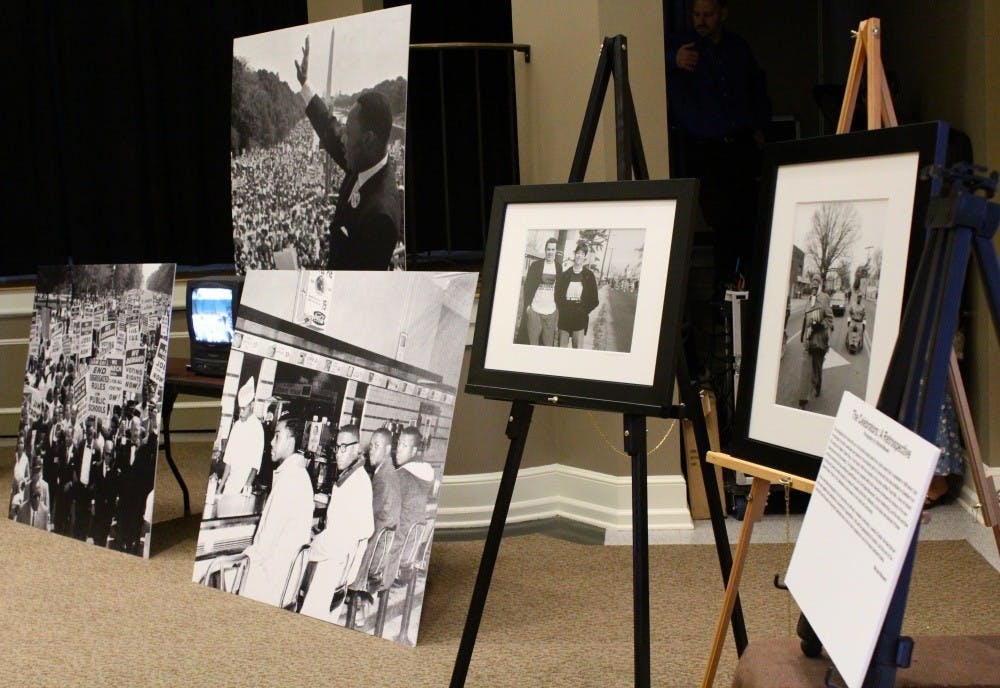The Martin Luther King Jr. National Memorial stands opposite the Jefferson Memorial in Washington, D.C. To Smith Jackson, vice president and dean of student life at Elon University, it is a reminder of the need for equal rights advocacy long after the establishment of the Bill of Rights. Elon's Martin Luther King Jr. commemorative activities remind the student body that these founding principles have not reached fruition.
In honor of the civil rights activist, the Martin Luther King Jr. Planning Committee organized an art showcase at College Coffee Tuesday to communicate the value of each individual, said Leon Williams, director of the multicultural center.
"It kind of personalizes it," Jackson said. "We have a national holiday, but it's about what we as a community do to reinforce thinking about the concepts and what this person did in his life."
The art showcase provided students with a view of history through the eyes of an artist, said junior Trishelle Byrd.
The art displayed contained expressions of freedom and liberation inspired by the Civil Rights Movement. The showcase enables artists to speak through their canvas, Williams said. Local galleries, North Carolina A&T and local artists contributed to the art showcase.
"In an effort to build on an existing and successful tradition on our campus, we see College Coffee as an opportunity for fellowship of the community with a common theme, and that theme is civil rights," Williams said.
Provided the history of North Carolina and Elon University, Byrd said she believes it is vital for Elon students to understand King's fight for justice.
"It's very important that we embrace MLK week and make sure that his efforts are not just dismissed or put on the back burner, that there be some light shed on these events and to know that they are very important for everyone to take part in," she said.
Broadening the message
Although the Civil Rights Movement of the 1940s, 50s and 60s represents inequities in race and ethnicity, the university's honorary program signifies a collaboration of diversity initiatives on campus. The Martin Luther King Jr. Planning Committee consists of representatives from the Multicultural Center, Office of Student Activities, University Advancement, North Carolina Teaching Fellows Program and Greek Life.
"Martin Luther King represented America, and so this shouldn't be the sole act of the Multicultural Center," Williams said. "It should be a shared responsibility of our institution."
The cooperation of various organizations acknowledges that civil rights movements continue to take place for other marginalized groups.
"I hope that students recognize that Martin Luther King was not only concerned about prejudice and acts of hate due to race, but that he was concerned with any form of discrimination," Jackson said. "That's what college is about: trying to understand the past and apply it to the present."
Localizing his fight
The Martin Luther King Jr. College Coffee reflects the Elon community's commitment to diversity, as represented by the Not on our Campus movement, according to Brooke Barnett, faculty administrative fellow for diversity and global engagement. The Not on our Campus campaign began in the fall after two separate instances in which a student was subjected to a racial slur from a passenger in a passing car.
"Remembering Martin Luther King serves in the same spirit of a community that welcomes all," she said. "What he is dong is standing for oppressed people and the Not on our Campus campaign is about how we won't tolerate intolerance on Elon's campus."
The Jan. 10 College Coffee demonstrates an environment supportive of community and education, according to Barnett. Nevertheless, Williams said he views the commemoration of King and the university campaign as more of a contradiction.
"I think it's a parallel between suffering and oppression and what continues to happen today," Williams said.
Although the Not on our Campus campaign symbolizes intolerance of oppression, the fight against injustice is not synonymous with the fight toward justice, he said.
"The fight against injustice is a recognized incident," Williams said. "The fight toward justice is a fight that we consciously make decisions without a motivator."
Action without a motivator is more congruent with the message of King, he said. Jackson said he hopes his memory will inspire the Elon community to promote a campus welcoming of differences.
"One of the strongest messages of our institution right now is that we hope people will not be bystanders," he said, "that they will be willing to say something, that they will be willing to promote in respectful ways, like Martin Luther King Jr. did, to make this a community where everyone is valued. I think it goes hand in glove with Not on our Campus."
While Jackson acknowledges that reacting to a problem does not always affect change, honoring King contributes to the dialogue between students and administration concerning diversity.
Sophomore Megan Guido agreed. Celebrating King makes students more conscious of prejudice on campus, even when discrimination may be unintentional, she said.
"Recognizing people whose actions are consistent with our university values is a way to continue that dialogue and affect change and enforce those same values," Jackson said.


